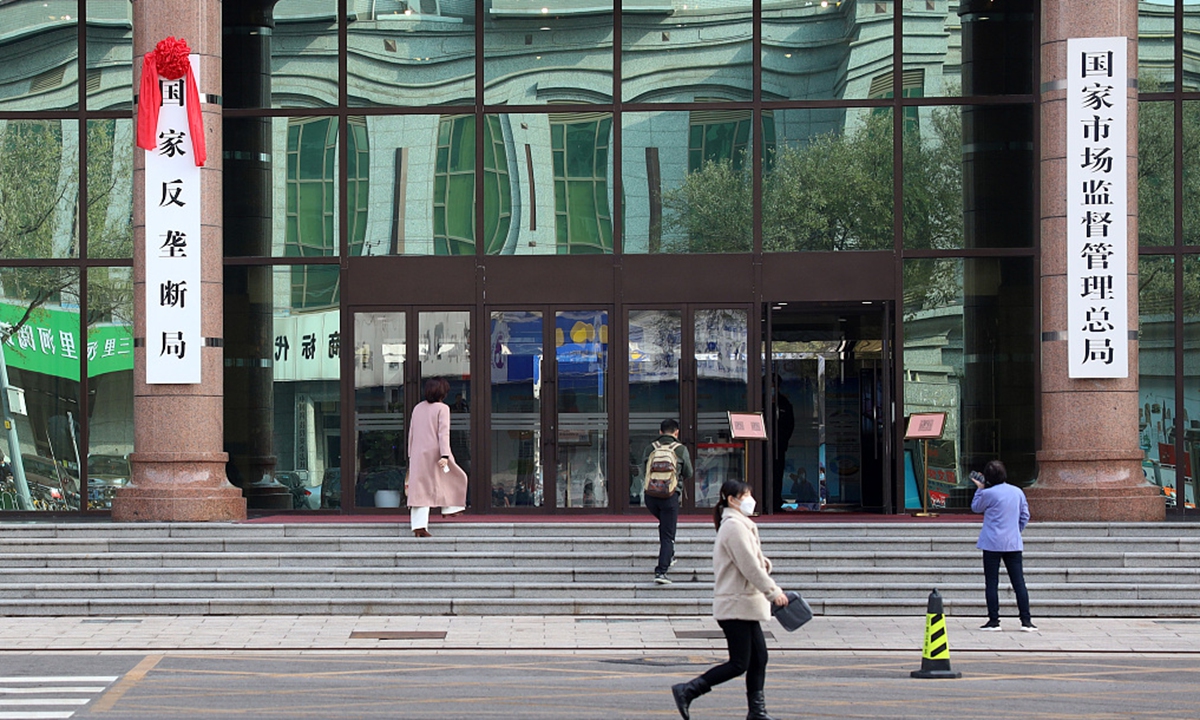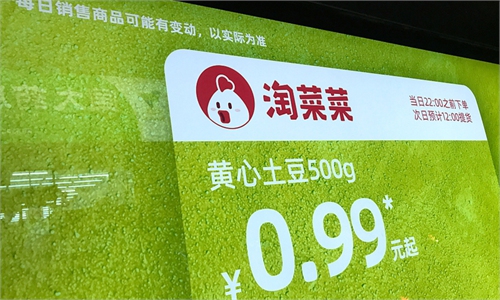Chinese regulator issues first antitrust fines in 2022, signals sustained campaign
Move signals sustained campaign in 2022 to ensure market order: experts

Photo shows the nameplate of National Anti-monopoly Bureau, which is in the same building of the State Administration for Market Regulation in Beijing. Photo: CFP
The State Administration for Market Regulation (SAMR), China's top market regulator, imposed fines on several domestic online giants, including Tencent, units of Alibaba and Bilibili, on the first working day of 2022 for violations of the Anti-Monopoly Law, in a fresh sign of China's continued efforts to crack down on illegal activities and ensure market order.
Experts believe that this marks the start of a sustained antitrust campaign in 2022, which will see more cases of this sort and more active enforcement of anti-monopoly regulations with the amendment of the Anti-Monopoly Law.
The SAMR imposed nine fines, each amounting to 500,000 yuan ($78,500), on Tencent, for a total of 4.5 million yuan. Most of the fines involve Tencent's illegal operations in the acquisition of smaller companies, according to filings published on Tencent's website.
For example, the SAMR imposed a fine on Tencent for not reporting its acquisition of an online wine retailing company based in South China's Guangxi Zhuang Autonomous Region. Tencent completed the acquisition in November 2020 along with another investment company.
Tencent was also fined for concealing its acquisition of a Beijing-based delivery company from anti-monopoly regulators.
Regulators also imposed a 500,000 yuan fine on Chinese online video company Bilibili for not reporting its stake in mobile picture editing software company Versa Inc to regulators. Bilibili signed a contract with Versa in early 2020 to take a 14.71 percent stake in the firm.
Alibaba (China) Network Technology Co, a subsidiary of Alibaba Group, was fined 500,000 yuan for not reporting its acquisition of Chinese supermarket company Xingli.
The fines came amid China's new stricter regulations targeting monopolistic practices in domestic online platforms. In April 2021, China imposed a record penalty of 18.23 billion yuan on Alibaba after determining that the company had abused its market position over the course of several years.
Online platforms Meituan and Tencent received fines of 3.4 billion yuan and 9 million yuan in total last year for breaching anti-monopoly regulations.
The fines rolled out on Wednesday may be just the start of a series of penalties that regulators will impose on online platforms and other companies for breaching anti-monopoly regulations, experts said, predicting that this year's antitrust campaign will become even more stringent compared with last year.
"Although last year's mega fine on Alibaba will not likely be surpassed because of the company's market scale, this year's anti-monopoly cases are likely to exceed last year's level, as the amended Anti-Monopoly Law is very likely to come into force in the first half of this year, and China's national anti-monopoly bureau was inaugurated last year," Zhou Zhaofeng, a managing partner with law firm Fieldfisher China, told the Global Times on Wednesday.
According to Zhou, online platforms usually had little awareness of anti-monopoly compliance in the past compared with many other industries. But with tightened anti-monopoly regulations as well as the recent penalties, those platforms are being forced to treat the issue more seriously, which is actually good for their own development, he said.
"Online companies' advantages should come from products and services, instead of vicious competition. The penalties are not against certain companies, but aim to create a better competitive environment that will benefit all online companies in the end," Zhou said.
Zhang Yi, CEO of the iiMedia Research Institute, also noted that China's internet industry has reached a stage where a lot of irregularities have emerged and regulators have to step in to establish order and standards.
"Many internet giants have formed a kind of monopoly over products, with the help of concentrated capital and other resources. This is not good for the industry's innovative development," Zhang told the Global Times.
The purpose of punishment is not to restrict the online economy, but to make sure these companies will grow in an orderly and sustainable way, Liu Dingding a Beijing-based independent analyst, told the Global Times on Wednesday.



